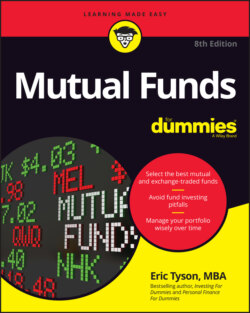Читать книгу Mutual Funds For Dummies - Eric Tyson - Страница 33
Getting a Grip on Funds
ОглавлениеA mutual fund is a collection of investment money pooled from many investors to be invested for a specific objective. When you invest in a fund, you buy shares and become a shareholder of the fund. The fund manager and a team of assistants determine which specific securities (for example, types of stocks or bonds) they should invest the shareholders’ money in to accomplish the objectives of the fund and keep shareholders happy.
A misconception some investors hold regarding mutual funds is that they all invest in stocks and, therefore, are too risky. They don’t, and they’re not. By using funds, you can invest in a whole array of securities, ranging from money market funds to bonds, stocks, and even real estate. And even within a specific class of investments such as stocks, which have greater short-term volatility, there’s a range of different types of stocks and therefore risk.
All funds aren’t created equal. Some funds, such as money market funds, carry virtually zero risk that your investment will decline in absolute value (but the purchasing power could indeed be eroded by inflation). Bond funds that invest in shorter-term bonds don’t generally budge by more than several percentage points per year. And you may be surprised to find out in Chapter 13 that some conservative stock funds aren’t that risky if you can plan on holding them for a decade or more.
Because good funds take most of the hassle out of figuring out which securities to invest in, they’re among the best investment vehicles ever created for the following reasons:
They allow you to diversify your investments — that is, invest in many different industries and companies instead of in just one or two; and funds let you achieve this diversification with small dollar amounts — something that wouldn’t be possible otherwise. By spreading the risk over a number of different securities representing different industries and companies, funds lessen your portfolio’s instability and the chances of a large permanent loss.
They enable you to hire the best money management firms and managers in the country to manage your money.
They are the ultimate couch potato investment! However, unlike staying home and binge watching your favorite series or playing video games, investing in funds can pay you big financial rewards.
What’s really cool about funds is that when you understand them, you realize they can help you meet many different financial goals. Maybe you’re building up an emergency savings stash of three to six months’ living expenses (a prudent idea, by the way). Perhaps you’re saving for a home purchase, retirement, or future educational costs. You may know what you need the money for, but you may not know how to protect the money you have and make it grow.
Don’t feel badly if you haven’t figured out a long-term financial plan or don’t have a goal in mind for the money you’re saving. Many people don’t have their finances organized, which is why I write books like this one! I talk more specifically in Chapter 3 about the kinds of goals funds can help you accomplish.
